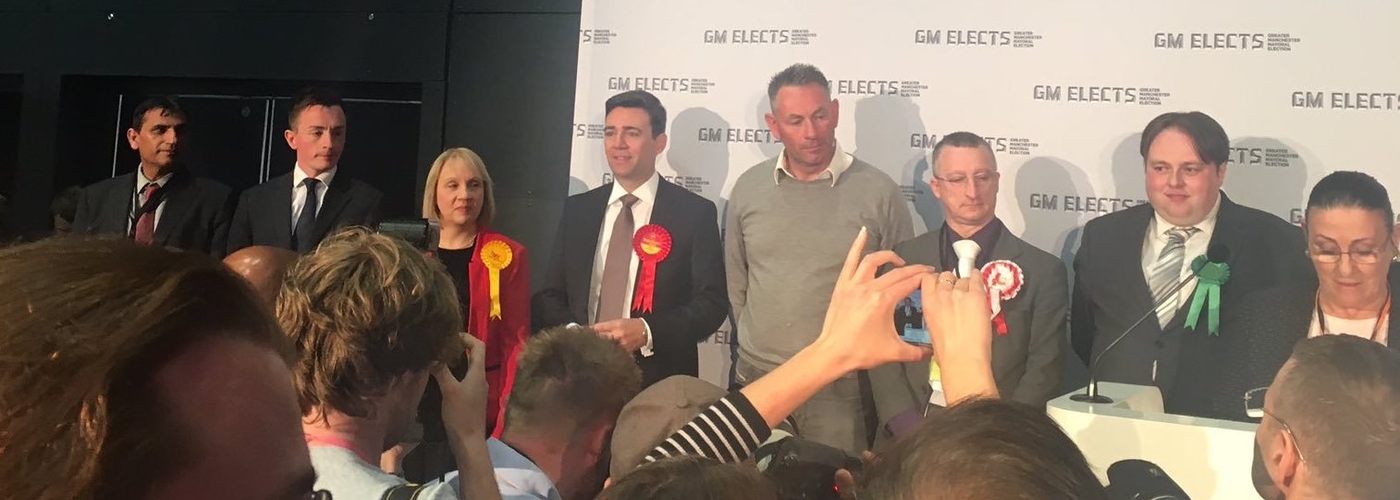Former Labour cabinet minister hits out at Westminster in victory speech
Former Labour cabinet minister and Leigh MP Andy Burnham has coasted to victory in the Greater Manchester Mayoral election, comfortably claiming all ten boroughs.
Burnham (pictured above, fourth from left) achieved 67% of the final count, totalling 359,352 votes. Runner-up, Tory candidate Sean Anstee, bagged 23% of the vote (128,752), while Lib Dem Jane Brophy gained 6% (34,334)
The Green Party candidate, Will Patterson, scored just 2% of the vote, whilst far-right party, the English Democrats, surprisingly (or perhaps not given the day this lot have had) bettered UKIP by 532 votes.
In a rousing victory speech full of anti-Westminster sentiment, Burnham told hundreds of supporters gathered in Manchester Central:
“We are going to change politics and make it work better for the people, we will give power and purpose to those people and places that Westminster has left behind.
“We will leave the old political way behind and create a new type of politics here in Greater Manchester, where young people won't be targets for the cuts, rather a priority for investment;where older people won’t be labelled bed blockers but treated with respect. Here, in this great city, we will never accept as an inevitable fact of modern life that for some people to succeed, others have to sleep rough on our cold streets."
“It saddens everyone here that the streets of Greater Manchester are providing the canvas for this picture of an unequal country. Well, no more, not here.”
What was the turnout?
Turnout results were not as low as first rumoured, with 28.93% of the 1.98 million electorate across Greater Manchester casting their votes.
In comparison, just 13.59% turned out to vote in the Greater Manchester Police and Crime Commissioner election of 2012, while the first London Mayoral election in 2000 had a turnout of 34.43%. Salford's Mayoral election of 2016 had a 30% turnout.
Of the ten boroughs of Greater Manchester, Trafford had the highest turnout of 38.35%, whilst Salford (which, as mentioned, elected a mayor last year) was lowest with 25.11%. Rochdale and Oldham weren't far behind, with 25.24% and 25.78% respectively.
As per his campaign – during which he pledged to commit 15% of his £110k salary towards the cause - the region’s escalating homelessness issue formed the backbone of Burnham’s speech. Addressing Theresa May directly, he said:
“Walk around this city tonight and you will see the reality behind your election slogans.
“We are living in a country that is clearly not working for everyone, Prime Minister, you’re cuts are leaving people who have served in the Armed Forced on the streets without mental health support, you are leaving eighteen-year-old care leavers with no housing benefit and nowhere to go.
“It saddens everyone here that the streets of Greater Manchester are providing the canvas for this picture of an unequal country. Well, no more, not here.”
Burnham used the platform to announce the launch of the new ‘Mayor’s Homelessness Fund’ which, he said, had one simple goal: “To end rough sleeping here by 2020 and put a shelter over every single head in Greater Manchester.”
“We will do this not by throwing public money at the problem, but by appealing to the natural generosity of the people of Greater Manchester,” he said. “By raising our own funds and by involving people in devising their own solutions – that is what I mean by doing politics differently.
“Greater Manchester stands on the verge of a great new era,” he continued, “this city has changed the world before, so lets go out there and do it all over again.”
However, come Monday, once the hyperbole has cooled, it’s down to the nitty-gritty for Burnham, who will effectively become chair of the ten leaders of the Greater Manchester Combined Authority (GMCA).
He will absorb powers over police and fire services, buses and trams, skills and a £300m housing budget. He will have a significant role in developing the region’s spatial framework (its long-term development plan) and become an influential voice on the 40-strong health and social care board, controlling a £6bn budget devolved last year from Westminster.
Ok so Burnham will not hold sweeping powers across this population of almost 2.8 million, but what Greater Manchester has now is not a shadowy committee of leaders - as with the GMCA - but a presence, a personality of ministerial experience, who we can ultimately hold accountable should things go wrong.
And if they do? Well, there's always the next election.
Ten things Burnham must do...
1) Promote manufacturing and boost Greater Manchester as a producer - we need more jobs and better jobs.
2) Promote vocational skills in young people to underpin point 1.
3) Trigger a revival of the other town centres, making sure it's not all about Manchester city centre.
4) Keep the conurbation moving by regional investment and the promotion of HS3.
5) Knock heads together over homelessness/begging so we really see change.
6) Stand up for Greater Manchester boldly and with vigour in the face of indecent cuts.
7) Underline again and again that we are a multicultural region open to immigration.
8) Promote identity and a sense of place amongst the population from Primary School upwards through active involvement.
9) Use the £300m housing loan fund to promote development away from Central Manchester.
10) Improve the regional centre's tourist appeal by knocking heads together over green space, litter, way-finding.















